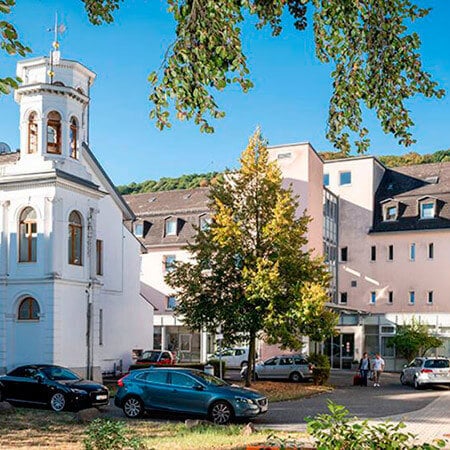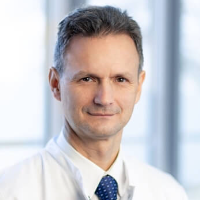Radiotherapy for Meningioma Treatment in the Best Hospitals in the World
Treatment prices are regulated by national law of the corresponding countries, but can also include additional hospital coefficients. In order to receive the individual cost calculation, please send us the request and medical records.

Department of Radiation Therapy and Radiation Oncology
The Department of Radiation Therapy and Radiation Oncology offers all types of modern radiation therapy for the highly effective treatment of benign and malignant tumors. The department is equipped with three linear accelerators and brachytherapy systems, which provide patients with the safest, most effective, and most sparing irradiation of tissues affected by oncopathology. The department also provides radiotherapy planning and radiosurgery. An ultramodern technical base, exceptional professionalism, and experience of the department's physicians are the cornerstones of successful clinical practice.





Department of Radiation Therapy
According to the Focus magazine, the University Hospital of Ludwig Maximilian University of Munich is regularly ranked among the best medical institutions in Germany! The hospital is the largest multidisciplinary medical facility, as well as a leading research and training center in Germany and Europe. The hospital is proud of its bicentenary history and tirelessly confirms its primacy at the national and international levels. The outstanding quality of medical care is complemented by highly productive research activities, thanks to which many effective diagnostic and therapeutic methods, saving people’s lives, have been presented in medical practice.







Department of Radiation Therapy
According to the Focus magazine, the Department of Radiation Therapy ranks among the top German medical facilities in the area of its specialization! The department offers all types of modern radiation therapy for cancer treatment at the highest level of university medicine. The priorities of the department's work include the treatment of tumors of the gastrointestinal tract, urogenital system in men, gynecological tumors in women, oncopathologies of the nervous system, as well as head and neck tumors. Each department's specialist strives to ensure all the patients with the most effective and at the same time customized treatment. Due attention is also paid to radiation protection.





Along with surgery, radiation therapy is one of the two main treatment methods for meningioma. It allows the doctors to destroy intracranial brain tumors. Modern methods of stereotactic radiation therapy are very accurate and safe. They are most often used after surgery for prevention of meningioma recurrence. Less commonly, they are used as an alternative to surgery, if the doctors cannot safely remove brain tumor for some reason. The main conditions for successful radiation therapy performing are availability of modern equipment and experienced doctors. In certain clinical situations it is better to seek treatment abroad in order to reach the desired result.
Indications
As a rule, beam radiation therapy is used after surgery. It is necessary in the following cases:
- After the impossibility of radical removal of the meningioma
- In malignant brain tumors, even if the radical resection is performed
If the doctor removes the neoplasm completely, along with the part of the dura mater and pathologically altered bone, or coagulates the matrix (meningioma growth area), such surgery is considered the radical one. After it, radiation is not required if the meningioma was benign.
Intermediate meningiomas are much rarer, and malignant ones are very rare. After surgery, such brain tumors always require irradiation, including the cases when the doctor performs total removal of the meningioma. Irradiation destroys the atypical cells that may remain at the tumor site. This is the measure of relapse prevention.
Sometimes stereotactic radiation therapy becomes the main treatment method. Stereotactic radiation therapy and radiosurgery are used in patients with hard-to-reach brain tumors or in patients with contraindications for surgery. Radiation is often used in the case of meningioma recurrence.
Stereotactic radiosurgery
Stereotactic radiosurgery is not similar to the conventional meningioma surgery. The doctor does not make incisions or remove the brain tumor physically. Radiosurgery includes a procedure of single irradiation of a meningioma – very accurate, using a large dose of radiation. After that, the tumor is destroyed, decreases in size, or at least stabilizes and stops growing.
Areas of the stereotactic surgery administration:
- Meningiomas of hard-to-reach localizations, which are difficult to remove with the help of surgery
- Small brain tumors – usually up to 3 cm, maximum – up to 3.5 cm, if surgery may be unsafe for the patient
- Patient refuses surgery in favor of stereotactic radiation therapy
- Medical contraindications for surgery
The use of radiation for destruction of meningioma has obvious advantages. The method is painless, bloodless, has minimal risks to the patient's health, well tolerated, and does not require long-term recovery. However, it also has disadvantages. Beam radiation therapy is less effective than surgery. It does not always eliminate all the symptoms. In addition, it does not have the immediate effect as the surgery does.
After the surgery, the clinical symptoms of meningioma regress during the early postoperative period, but beam radiation therapy does not lead to such a rapid effect. The tumor dies off gradually. It decreases in size, and sometimes disappears completely, but this process lasts from 3 to 12 months. As a rule, the neoplasm does not regress completely, and in some cases it does not even decrease, but only stabilizes in size.
Contraindications
Since stereotactic radiosurgery does not have an immediate therapeutic result and may provide clinical improvement only after a few months, its use is inappropriate for rapidly growing aggressive tumors, cerebral edema, and increased intracranial pressure.
Other contraindications are as follows:
- Uncontrolled seizures
- Severe neurological symptoms
- Severe somatic condition of the patient
- Diameter of the neoplasm is more than 3.5 cm
Stereotactic radiotherapy
Stereotactic radiation therapy can be performed in hypofractionation mode. In fact, this irradiation regime is not much different from radiosurgery. The difference is only in the number of sessions: in this case the entire dose of radiation is divided into several fractions. Therefore, stereotaxic radiation therapy in hypofraction mode requires from 2 to 7 irradiation sessions.
As in radiosurgery, Gamma Knife systems and linear accelerators, including CyberKnife, are used for stereotactic radiation therapy. This device uses a robotic system, which directs up to 3,000 beams from different angles to the brain tumor.
The treatment is quick and painless for the patient. One radiation session takes 30-60 minutes. When using Gamma Knife, a stereotaxic frame is fixed on the head. CyberKnife does not require its use, therefore it makes the treatment process even more comfortable.
Complications and side effects of the radiation therapy
Beam radiation therapy inevitably emits some dose of radiation not only at meningioma, but also at the healthy brain tissue. Therefore, it often causes the following side effects:
- Nausea
- Headache
- Fatigue
- Weakness
- Irritability
- Sleep disorders, etc.
Complications may occur after radiation therapy. They may appear not immediately, but in a few months or even years after treatment.
One of the most dangerous complications is radiation brain necrosis. It develops on average in 3% of patients and is associated with the death of tissues that receive a high dose of radiation. Sometimes, radiation necrosis is asymptomatic and is only detected on MRI, but in some patients, it develops in the functionally important brain regions and causes severe neurological damage. In such cases the radiation necrosis requires surgery for elimination of symptoms.
Other consequences of beam radiation therapy include memory disorders, mental and cognitive disorders. They occur in a small number of patients. However, the risk of complications is much lower if you undergo radiation therapy on modern equipment.
State-of-the-art linear accelerators, Gamma Knife and CyberKnife systems direct beams to the tumor from different angles. They do it very accurately, so healthy tissues receive a minimum dose of radiation.
Proton therapy for the treatment of meningioma
Sometimes meningioma arises at the skull base, near the cavernous sinus, or in the area of the optic nerve cross (optic chiasma). In such cases, standard radiation therapy is more likely to cause complications. Proton therapy can be used as an alternative treatment option. It is definitely better, as it has high accuracy and safety. However the high cost of treatment still hampers the use of the method in the current clinical practice.
Proton therapy is a type of radiation therapy, which implies the treatment for meningioma with protons rather than photons. Their peculiarity is the release of energy after reaching the target, not along the entire trajectory on the way to the tumor. This means that when protons pass through healthy brain tissue and nerves, they practically do not damage them.
Proton therapy has the following benefits:
- Reduced risk of side effects and complications
- Better quality of life after the treatment completion
- Reduced risk of secondary brain tumors (resulting from irradiation of healthy tissues)
- Possibility of meningioma irradiation without damaging the adjacent cranial nerves
- Method of choice in children
Nevertheless, the proton therapy has the following disadvantages:
- High cost of treatment with comparable efficacy to photon irradiation (likelihood of curing meningioma does not increase)
- Low availability – this type of radiation therapy requires expensive, massive equipment, so it is used only in some specialized centers
Why is it better to undergo treatment abroad?
Many patients with brain meningioma go abroad for more effective, safer surgery and stereotactic radiation therapy. The medical treatment in the best hospitals in the world has a number of advantages.
Accurate diagnosis making. It allows the doctor to perfectly plan the treatment taking into account the size of the tumor, its location, and the degree of malignancy. This leads to low complications rates and improves clinical prognosis.
Safe surgery. The doctor uses intraoperative functional diagnostics and neuronavigation in order to avoid damaging important areas of the brain. Neurosurgeons abroad coagulate, ligate large vessels, and sometimes embolize them even before the operation in order to avoid severe bleeding. This leads to faster recovery in the postprocedure period.
High quality equipment for radiation therapy. Stereotactic radiation therapy and radiosurgery are carried out on the latest equipment and linear accelerators. They irradiate the meningioma with minimal radiation exposure of the healthy brain tissue and nearby structures.
Availability of new irradiation methods. Some medical centers abroad use proton therapy. It is safer, and can be used for skull base meningiomas. In addition, proton therapy is often used in pediatric neuro-oncology.
Medical treatment abroad with Booking Health
To undergo meningioma treatment abroad at an affordable price, you can use the Booking Health service. On the Booking health portal you can find the information about clinics, doctors, prices, therapy methods for brain tumors, as well as compare the cost of treatment in different hospitals and book the medical program at the best price.
The Booking Health company will arrange a treatment abroad for you. We provide the following services and benefits:
- Selection of the hospital, which specializes in the treatment for meningioma and applies the latest types of radiation therapy, including radiosurgery
- Direct communication with the selected doctor
- Reduced waiting period for a radiosurgery treatment and making the appointment on the convenient date
- Reduced cost of treatment abroad – prices are lower due to the absence of coefficients for foreign patients
- Relevant information about your expenses, the cost of procedures, funds remaining in your account
- Elaboration of the treatment program without repeating previously performed diagnostic tests
- Communication with the hospital upon the medical program completion
- Buying and forwarding medicines
- Organization of additional procedures for diagnosis making or treatment abroad, as well as neurological rehabilitation
The specialists of Booking Health provide high-quality services. We will book a hotel and airline tickets for you, organize a transfer from the airport to the hospital and back. During the whole medical program, your personal medical coordinator will stay in touch 24/7 and assist you in all issues.

